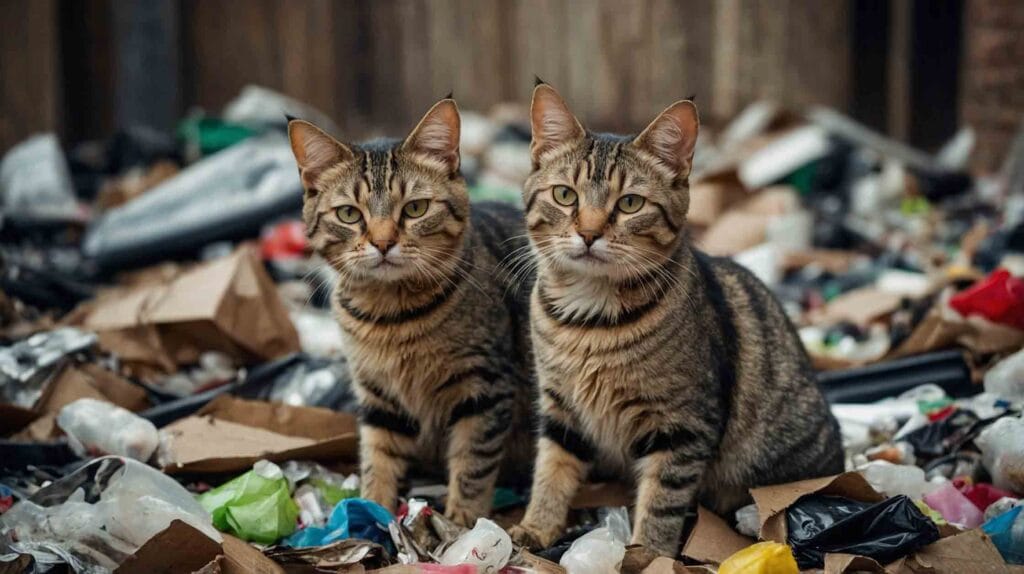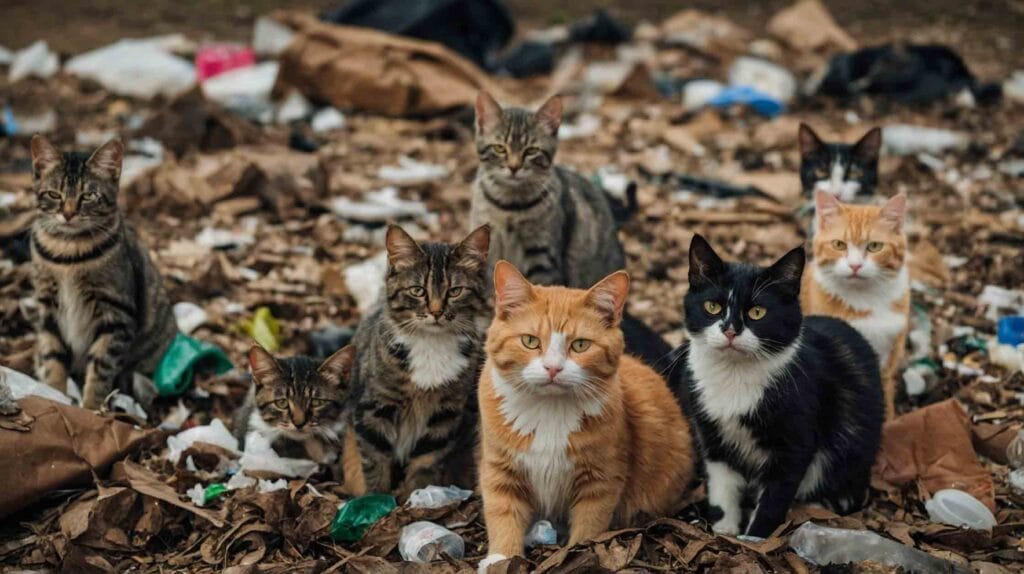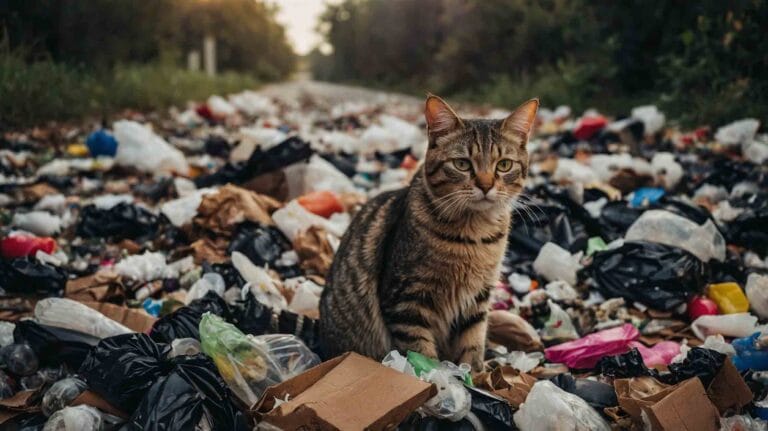No one can deny cats are cute, but let us face it. They can be cats and get into clean trash. Finding some poor thing you certainly would like to help, or maybe your own pet, or maybe a stray in a neighbourhood you don’t want to take care of, retreats further back and watches as their food and everything else one minute safe in the trash bin are now lying in shambles.
of course, Garbage is an irresistible treasure trove of smells and textures, anything an ever curious and ever resourceful cat can find interesting.
This behaviour is beyond annoyance, as it can put cats in danger and cause hygiene issues for the owners.
In this article, we’ll talk about humane effective and practical ways to keep cats out of the garbage once and for all. Let’s see how to keep cats out of garbage.
What is Feline Behaviour?
In order to tackle the problem correctly, you have to understand why these cats are so attracted to the garbage.
Cats are instinctual scavengers and hunters, owing to their amazing sense of smell and their bound less curiosity.
They’re interested in the faintest whiff of leftover food or the rustle of a plastic bag, for example.
Garbage bins are a reliable source of sustenance for exotic or stray cats since this place, in the case of food scraps, is like a source of food.
Beyond that cats are natural playthings. Garbage bags are so textured, the stuff inside them so varied, and the chance to ‘hunt’ for something that’s remotely appealing, it’s all a feline playground.
Identifying these instincts allows us to create plans where our garbage is safe, yet our homes are attuned to our immediate survival needs.
The Risks of Cats Accessing Garbage
It’s not just not convenient, allowing cats access to garbage is dangerous. A cat is likely to be poisoned from ingesting something sharp or toxic or spoiled food if it eats pieces of trash.
Injuries or blockages of the digestive system may also be caused by bones, broken glass and plastic. If consumed, chemicals or cleaning products disposed of in the trash can be fatal.

From a more general perspective, sifting through the garbage causes environmental messes and brings rats or racoons around. Clean up is exhausting for homeowners, and renters can raise tensions with neighbours when it happens over and over.
This behaviour isn’t just about protecting your property it is also to protect the welfare of your cats.
Proper Garbage management is a prevention
Make sure your trash is kept secure, the first line of defence against cats in the trash. Begin by purchasing strong, top notch trash cans with a good sealing lid.
If you are using models that aren’t animal proof, look for those specifically designed for cats, which usually have locking mechanisms or weighted lids that cats struggle to open.
Just as important is regularly disposing of garbage. Curious felines are invited to have a look round overflowing bins or in trash bags left outside.
Garbage should be stored indoors or in a garage, if possible, until collection day. Doubling up on bags of food waste can minimise odours and help keep your cat from finding anything to eat.
How to Use Natural Deterrents to Keep Cats Away
Because cats depend on their sense of smell, scent deterrents are a great way to keep cats away from the garbage. Cats absolutely detest citrus scents let’s use orange or lemon peels.
You can put these around your garbage cans so they don’t have to get close.
Vinegar and ammonia are also potent smelling things cats seem to shun, albeit in moderation, since overdoing these will lead to irritation of human senses, too.
Lavender, rosemary or rue, to name a few are natural cat repellents.
Plant these around your garbage area or use essential oils extracted from them, and they perform a wonderfully mild, but effective deterrent.
Worked Great for me, and these options are particularly useful as non toxic eco friendly solutions for those who have those sorts of preferences.
Also read: Can Cats Produce Milk for Other Kittens? 5 Vet best Answer
Using Natural Deterrents to Keep Cats Away
Another time, it’s only as simple as making the garbage inaccessible to cats physically.
One way to avoid stray and pet cats reaching those trash bins is to place them in an area that will protect them, like a shed or behind a fenced enclosure.

If you must store items outside, use netting or a cover that keeps animals from getting in.
While storing trash cans, opt for trash cans with weighted lids or locking mechanisms for added security.
They’re good at dealing with persistent cats who have learnt to overturn bins or push their way inside.
The point is learning to make an inconvenient enough barrier without causing harm.
Also read: Why Is My Cat Ignoring Me? 7 Hidden Reasons Explained by Vet
Training Cats to Avoid Garbage
If you’re a pet owner, training your cat not to go near garbage can be a long-term solution.
Cats are intelligent and can be trained to associate garbage with the worst outcomes or directed to more socially appropriate activities.
Positive reinforcement techniques establish when good behaviour should be rewarded, with treats and praise being some examples of working on your cat ignoring the trash.
That can also be helped by providing alternative outlets for that particular curiosity.
Your cat can be occupied by interactive toys, scratching posts, or puzzle feeders making him less inclined to go into the garbage for stimulation.
There’s no use in having some in the family lay down rules they don’t enforce while everyone in the household does just that by enacting the same rules for everyone.
Also read: Why Do Cats Sleep by Your Feet? Vet 5 Surprising Truth
Technological Solutions for Persistent Problems
Until this moment, technology is the only way to find your cat, for example, if traditional methods to keep cats out of garbage don’t work.
Despite the fact that it’s illegal to do so, motion activated sprinklers or even alarms can be set up around the trash they’ll scare cats away when they get too close, preventing them from ever coming back.
Deterrent devices based on high frequency sounds, called ultrasound, are inaudible to humans but still unpleasant to cats.
For those into the high tech solution, a smart trash can that has a better locking system or motion sensors can be an excellent choice.
The best part about these cans is that they automatically seal themselves, or output deterrent sounds when someone tampered with them so that your garbage remains unmolested.
Also read: Why Do Cats Lick Their Paws? 5 Vet-Approved Explanations
Community and Neighborhood Strategies
If it’s stray or feral cats who are the main culprits, the problem can’t be solved on an individual basis alone the community has to get involved.
Educate your neighbours about the need for secure garbage disposal so your cats don’t get the habit of scavenging the area.
Together, set up cat-friendly zones (feeding stations or shelters) away from the garbage bins so that cats can’t waste time with the garbage.
Sometimes you’ll need to work with local animal control or shelters. TNR programs humanely manage stray cat populations and, over the long term reduce the number of cats scavenging for food.
Also read: Why Do Cats Attack Their Owners? 10 Vet-Approved Ways
When All Else Fails: Professional Help
If you find that you can’t keep cats out of garbage, you might need professional help.
A veterinarian or an animal behaviourist may be able to explain why a certain cat is attracted to garbage and give you good ways to help it.
It may be most effective for stray or feral cats to go with humane traps or use relocation services.
The main thing to bear in mind, though, is that we always want to tackle the problem without endangering the cats.
It takes patience and persistence because it might take time to find the right combination of employment tactics.
Wrap up on How to Keep Cats Out of Garbage
Keeping cats out of the garbage is not a one trick pony, it requires analysis of their behaviour, securing your trash, and the effective use of deterrents.
Luckily, there are plenty of natural and high tech ways to prevent this common problem without resorting to harmful measures.
There are proactive steps you can take to protect your property. You can be consistent with hygiene, and you can keep the cats safe.
It is well within our power to achieve harmony between humans and their feline neighbours with some little effort and some creativity.
Also read: What B Vitamin is Good for Cats with Allergies?
FAQ: How to Keep Cats Out of Garbage
q1: How to Keep Cats Out of Garbage at Night?
Ans: Tightly sealed trash cans with tight fitting lids will prevent cats from coming to the garbage to feed at night and will also prevent trap bait from being taken by cats. Keep garbage placed inside, or in a place which is always locked. Try to use natural repellents such as citrus peels or vinegar around the bins and do not leave your food scraps exposed.
q2: what can I spray on garbage to keep animal away?
Ans: A mixture of vinegar and water or ammonia sprayed will keep animals away from your garbage. Also quite effective are citrus sprays and commercial repellents. Secure lids tightly.
q3: does Windex keep cats away?
Ans: Keeping cats away isn’t safe or effective with Windex. If your cat ingests or inhales its chemicals, it could be harmful to your cat. Use citrus scent cat safe deterrents instead.
q4: what do I keep my cat away from the bin?
Ans: Lid them up or childproof lock them up to keep your cat away from the bin. They can be deterred with double sided tape and citrus scents. Try small toys or feed near a place that is already familiar.
q5: how do you keep your cats out of the trash?
Ans: Place trash in a cabinet, secure the lid of a lidded garbage can with a rubber band, or buy a lidded garbage can. Use deterrent sprays, distractions such as toys and regular training.
